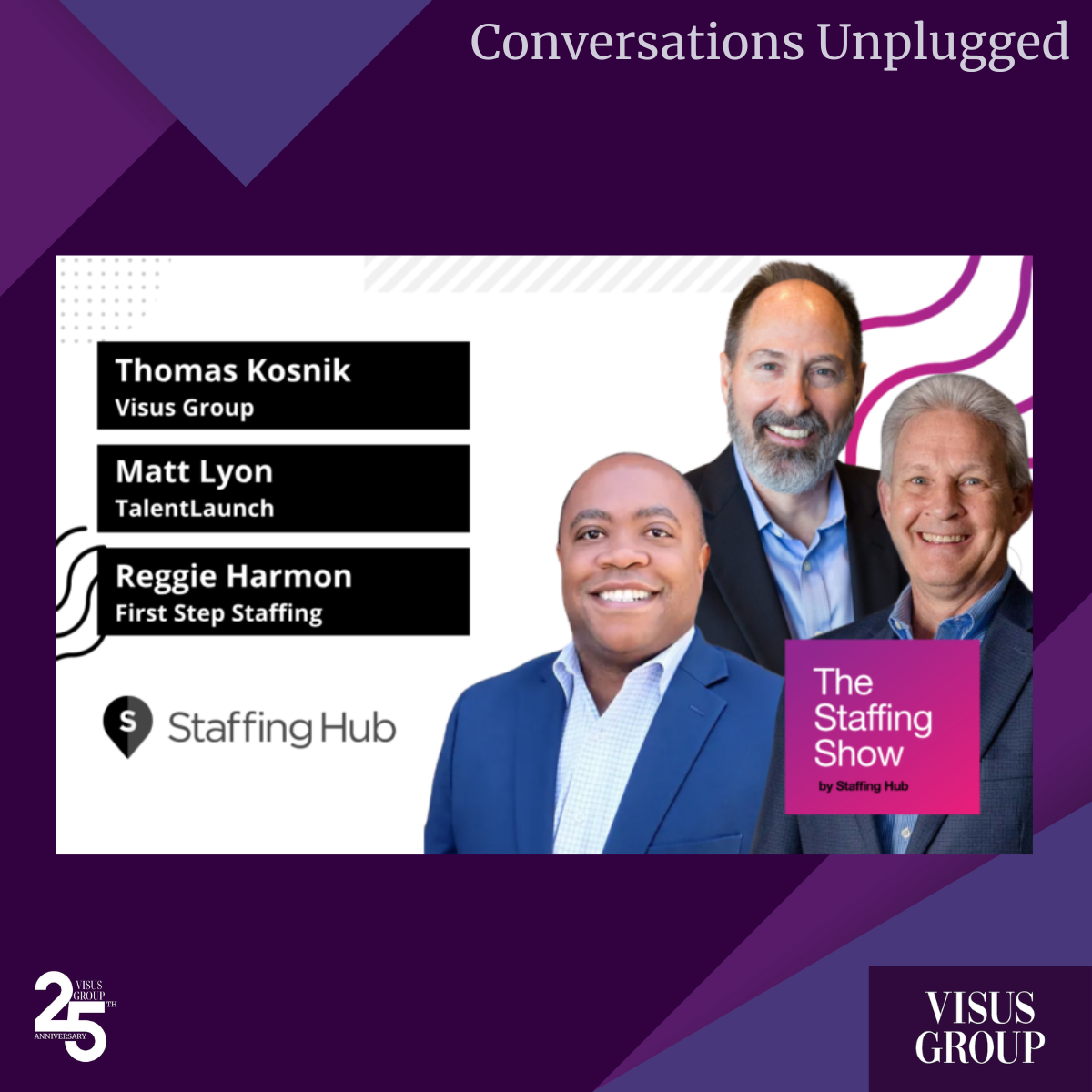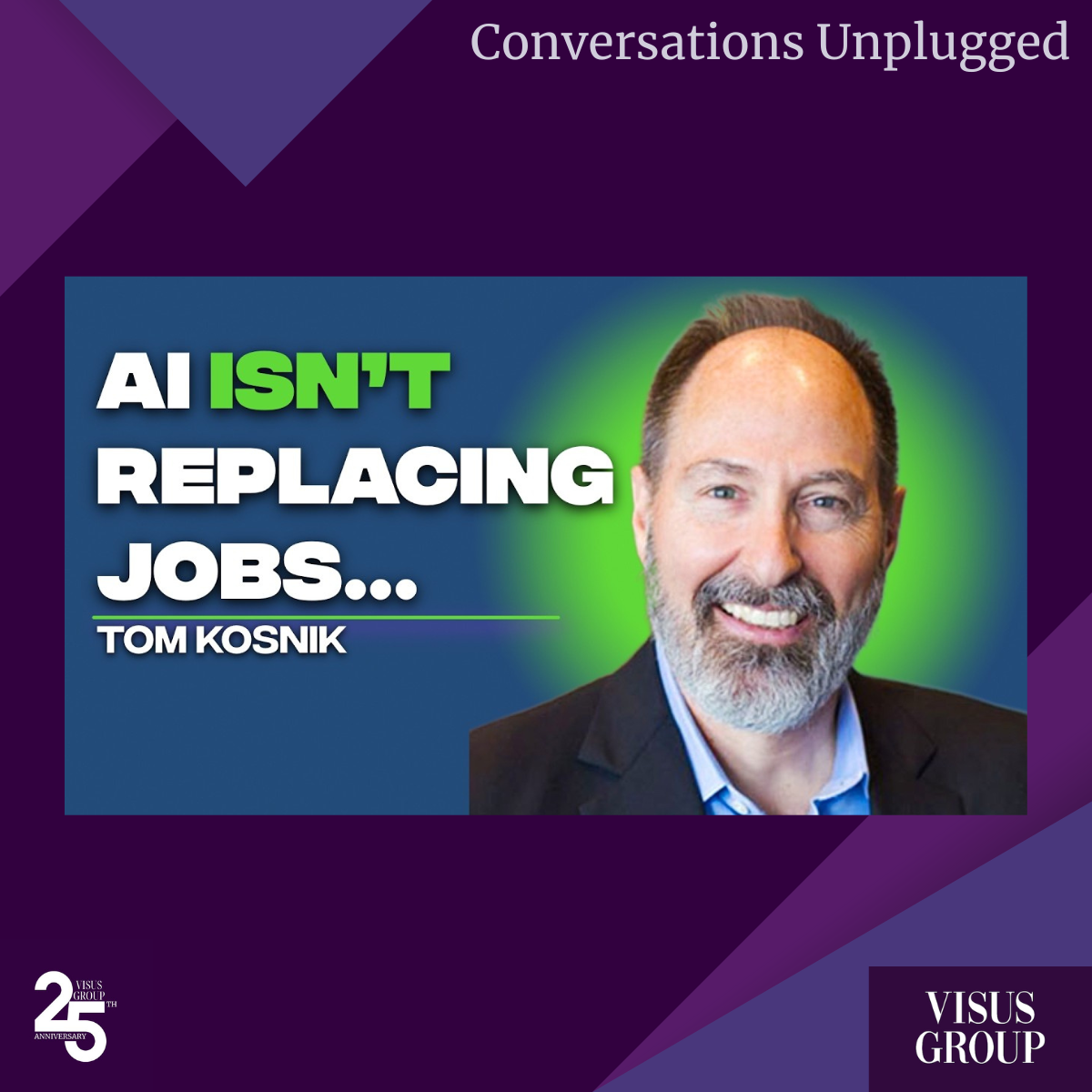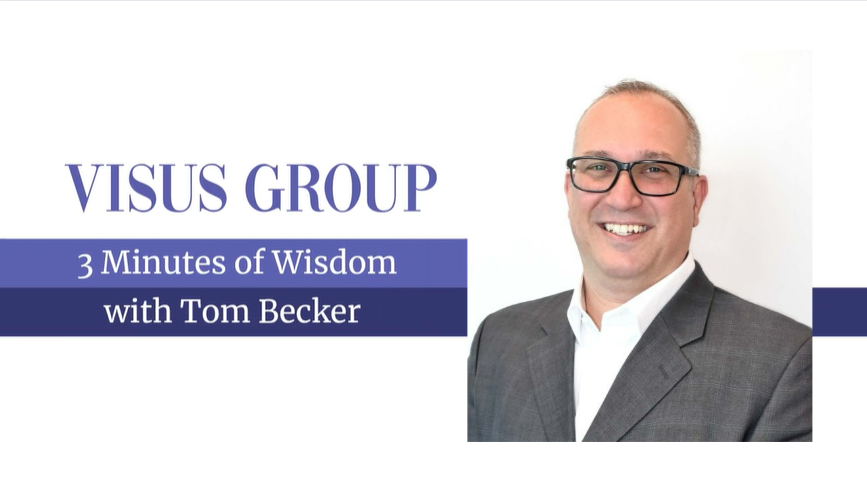In this episode, we explore the critical role of company culture in successful mergers and acquisitions. Joined by Thomas Kosnik of the Visus Group, Matthew Lyon of TalentLaunch, and Reggie Harmon of First Step Staffing, we uncover strategies for structuring deals, achieving organic growth, and avoiding costly mistakes. Dive into their budgeting insights, compensation planning tips, and predictions for the staffing industry's future. Don’t miss this expert discussion packed with actionable advice!
Continue readingDouble ROI- Financial and Community Impact
Join Amelia Nickerson, CEO of First Step Staffing, as she reveals how investing in your community drives both financial growth and meaningful impact. In just 3 minutes, discover actionable insights to enhance your brand and achieve double ROI.
Continue readingInside Staffing’s Future: Tom Kosnik on Remote Work and AI Evolution
Join Bill Keller and staffing expert Tom Kosnik, founder of Visus Group, as they discuss the future of remote work, the impact of AI on staffing, and strategies for navigating today’s evolving workplace. With 25+ years in the industry, Tom shares key insights into hybrid work models, recruiting automation, and integrating overseas talent. Perfect for leaders and HR pros adapting to modern staffing challenges—don’t miss it!
Continue readingFrom $1M to $25M: Strategic Steps for Recruiting Business Success with Thomas Kosnik
In this episode, Tom Kosnik, President of Visus Group, delves into the challenges of scaling a recruiting business from $1 million to $25 million. He shares key insights on personal branding, leadership, and embracing technological advancements like AI and automation, all essential for navigating today’s competitive recruiting landscape.
Continue readingSecond Chances
Building a company with a purpose isn't just about profits; it's about changing lives and reshaping futures.
Continue readingEfficiency Metrics That Every Staffing Firm Should Be Measuring
What are the one or two things staffing firms should really be measuring? om Becker, Executive Vice President of Recruiting, Diversity and Talent for the Judge Group talks about efficiency in an organization and how to be efficient using a process maturity model.
Continue readingHumility, Curiosity, and Vulnerability
Importance of humility, curiosity, and vulnerability- All three superpowers we have as humans. These qualities are the cornerstone of effective leadership and personal growth.
Continue readingHow to Build Leaders?
From one office and one employee to 100 offices and 400 employees. Rene Poch, Founder of Trillium Staffing, talks about how he built leaders who truly run the business units for him.
Continue readingHow Does Success Look Like in a Post- Pandemic Environment
Clint Clevenger, Senior Vice President of Greenstaff Medical, as he describes what success looks like for staffing firms in the healthcare industry in a post-pandemic environment.
Continue readingThe Four Keys to Building a World-Class Production Team
“You cannot motivate people! All you can do is create an environment that encourages performance”. How about that statement? It did not come from me. Rather it came from my associate Steve Armstrong that was managing $4 billion in staffing revenue. How about this statement from Steve, “The number one driver of productivity is if the employee believes his or her manager cares about them.” Yikes! My associates involved in the extensive research conducted by Gallup on what the greatest managers do would disagree. They would say, “The number one driver of productivity is if the employee knows what is expected of them”. Creating an environment that encourages performance, clearly communicating expectations, caring for the persons being managed, etc.. Where in the world does a small business owner or manager begin in developing a world class team?
#1 Define The Roles
Developing a world class team begins with clearly defining the specific responsibilities for each role on the team. Let’s take fulfillment. The recruiters, are they sourcing, conducting phone screens, selling candidates on job opportunities, doctoring up resumes, negotiating pay rates & benefits & training, selling hiring authorities on candidates, etc.? Are the recruiters running a full desk? If yes, what exactly does that mean? How about the sales representative role? What percentage of the role is research, prospecting, getting contracts signed, job order information, developing relationships, presenting candidates, negotiating, solving post hiring problems? With both the recruiting role and the sales representative role there are so many moving parts. The very first thing to consider in developing a world class team is clearly – clearly – clearly defining all the specific work tasks and responsibilities specific to each role on the team.
#2 Establish Expectations
No doubt, establishing achievable expectations is an area that the staffing industry struggles with. It must be done in order to develop a world class team. These are the performance metrics that surround the role(s). On the fulfillment side, think about phone calls, phone time, connects, phone screens, interviews, submissions, starts, etc. On the sales side think about connects, face-to-face or zoom meetings, networking events, leads followed up on from recruiting or marketing, etc. Some business owners I have met say, “When I worked at X-staffing company I never agreed with or liked the metrics. I always said that if I owned my own staffing firm, I would never have performance metrics.” Think about this, the expectations that surround the role(s) is how an organization communicates to its employees how to succeed within the organization. Remember the Gallup data, “The number one driver of productivity is if the employee knows what is expected of them”. And if you ask employees, they want to know how to succeed in the company. Employees “want to know” what to do on a day-to-day basis that leads to success and productivity.
#3 Create a Development Plan
The staffing industry benchmarking data shows that staffing firms spend less than 1% of revenue on training and development. At the end of the year, if the sales reps and recruiters are not faster, smarter, better than they were at the beginning of the year then the management has failed in their job responsibilities. We have two dynamics here: training and development. Training is all about how to use the Applicant Tracking System, learning the recruiting methodology, learning the sales methodology, and all the intricate work tasks attached to these methodologies. The best staffing companies in the industry offer training every week. Why? Technologies change, processes change, customers change, and we all get stuck into bad habits. Development is all about knowledge and skills. Are the sales reps getting better at getting in the door of new clients or improving on ratios between jobs orders obtained and temps or contractors billing? Are the recruiters getting better at hires to submissions? Sales reps and recruiters move from a novice to junior to a senior. Well, who on board is “developing” them into seniors? How does that happen in the organization?
#4 Connecting the Dots
Back to Steve, my associate, does the manager actually show they care about their team members? I had a client that once told me that on Monday morning he would go around the office and greet all the employees, ask about their weekend, wish the best for the week and on Friday, as employees were leaving for the weekend, he would show them a spreadsheet and inform them if they made him money or cost him money. I laugh every time I think about this story. The reason why caring and connecting with team members is so important is that it is impossible to understand what is important to employees if no one connects with them. It is the pathway to understanding what motivates them (it is not always money). Rather, the intrinsic motivations, the aspirations, the challenges that all employees bring with them into the work environment.
Developing a world class production team is no short order. There are certainly a lot of moving parts with many components to consider. I have mentioned just a few of them here in this short blog. At the Visus Group, this is what we do. We help staffing organizations take a step back, think out, map out and develop world class production teams. Retention, engagement, productivity and profits go through the roof. Visit us at www.visusgroup.com to learn more about how you can benefit from a relationship with us.










